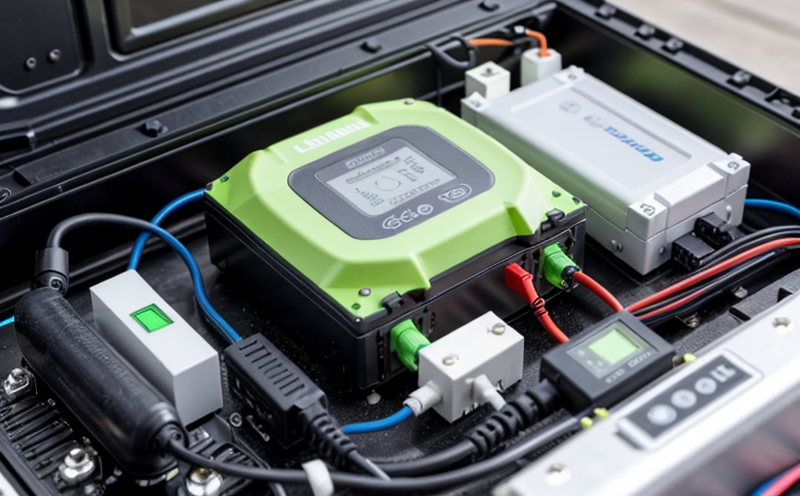IEEE 1625 Lithium-Ion Battery Testing for Portable Computer Systems
The IEEE standard IEEE 1625 is a critical document that sets forth the testing procedures specifically designed to evaluate the performance, safety, and reliability of lithium-ion batteries used in portable computer systems. This standard ensures that the batteries meet stringent requirements for safe operation, which is essential given the widespread use of these devices in various sectors including consumer electronics, healthcare, aviation, and more.
The IEEE 1625 standard covers a wide range of tests that are crucial to ensure the robustness and safety of lithium-ion batteries. These include but are not limited to charge/discharge cycling tests, high/low temperature storage tests, overcharge protection tests, short circuit protection tests, as well as safety margin evaluations under various stress conditions.
The testing procedures outlined in IEEE 1625 are designed to simulate real-world usage scenarios that a lithium-ion battery might encounter. This includes the impact of repeated charging and discharging cycles on the battery's performance over time, exposure to extreme temperature variations, and ensuring that the battery can safely withstand unexpected conditions such as overheating or overcharging.
By adhering to IEEE 1625, manufacturers are not only complying with industry standards but also enhancing product quality and safety. This ensures that portable computer systems equipped with lithium-ion batteries operate reliably under a variety of conditions, thereby improving the overall user experience and reducing the risk of potential hazards associated with battery failures.
The testing process involves several key steps:
- Initial characterization of the battery to establish baseline performance metrics.
- Charge/discharge cycling tests to evaluate longevity and efficiency over multiple cycles.
- High/low temperature storage tests to assess thermal stability under extreme conditions.
- Overcharge protection tests to ensure the battery can recover from high voltage states without damage.
- Short circuit protection tests to verify that the battery can withstand short-circuit events safely.
The data collected during these tests is meticulously analyzed and reported, providing insights into the battery's performance characteristics. This comprehensive approach ensures that any potential issues are identified early on, allowing for necessary adjustments before mass production begins.
Compliance with IEEE 1625 not only enhances product quality but also supports regulatory compliance, which is crucial in ensuring safe usage of portable computer systems across various industries. By adhering to this standard, manufacturers can confidently offer products that meet or exceed industry expectations for safety and reliability.
Industry Applications
- Consumer Electronics: Ensuring the longevity and safety of lithium-ion batteries in gadgets like smartphones and tablets.
- Healthcare: Guaranteeing reliable power supply for medical devices that depend on portable computer systems.
- Aerospace: Maintaining operational readiness by ensuring that lithium-ion batteries in aviation equipment comply with stringent safety standards.
- Military: Providing robust and dependable power sources for military-grade portable electronics.
The IEEE 1625 standard plays a pivotal role in these applications, ensuring that the lithium-ion batteries used are not only safe but also capable of withstanding the unique demands placed on them by each industry. This standardization is essential to prevent malfunctions and potential hazards associated with battery failures.
Customer Impact and Satisfaction
The implementation of IEEE 1625 Lithium-Ion Battery Testing for Portable Computer Systems significantly impacts customers by enhancing product safety, reliability, and performance. By adhering to this standard, manufacturers ensure that the batteries used in portable computer systems are robust enough to withstand various environmental and operational conditions.
Customers benefit from enhanced product quality through consistent compliance with industry standards. This translates into products that perform reliably over time, reducing the likelihood of unexpected failures or malfunctions. Additionally, by ensuring safety margins under extreme conditions, customers can trust that their devices will operate safely in diverse environments.
The testing process also provides valuable data that helps manufacturers identify and address any potential issues early on. This proactive approach ensures that products are refined before they reach the market, resulting in higher customer satisfaction and loyalty. In an increasingly competitive marketplace, meeting or exceeding industry standards is crucial for maintaining a strong reputation and gaining a competitive edge.
Furthermore, compliance with IEEE 1625 supports regulatory requirements, which is essential for avoiding legal issues and potential recalls. This not only protects the manufacturer but also ensures that customers receive products that are safe and reliable.
Competitive Advantage and Market Impact
The adoption of IEEE 1625 Lithium-Ion Battery Testing for Portable Computer Systems offers manufacturers a significant competitive advantage in the marketplace. By ensuring that their products meet or exceed industry standards, manufacturers can differentiate themselves from competitors who may not adhere to such stringent testing protocols.
Customers are more likely to choose products that have undergone thorough testing and comply with recognized industry standards like IEEE 1625. This enhances brand reputation and customer trust, leading to increased sales and market share. Additionally, compliance with this standard demonstrates a commitment to quality and safety, which is increasingly important in today’s consumer-driven market.
The data generated from these tests can also be used to improve future product designs and development processes. By identifying potential weaknesses or areas for improvement early on, manufacturers can innovate more effectively, leading to the creation of better-performing products that meet evolving customer needs.
Furthermore, compliance with IEEE 1625 supports regulatory requirements, ensuring that products are safe for use in various environments. This reduces the risk of recalls and legal issues, which can be costly and damaging to a brand’s reputation. By maintaining high standards throughout the manufacturing process, manufacturers can avoid these pitfalls, thereby protecting their market position.





